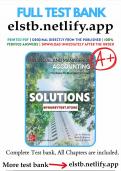Exam (elaborations)
Bank for Financial & Managerial Accounting 20th Edition Williams All Chapters Are Included
- Course
- Institution
- Book
ACCOUNTING: INFORMATION FOR DECISION MAKING OVERVIEW OF BRIEF EXERCISES, EXERCISES, AND CRITICAL THINKING CASES Analysis, communication, judgment Analysis, communication, judgment Analysis, judgment, research Due to the introductory nature of this chapter and the conceptual nature of its c...
[Show more]



